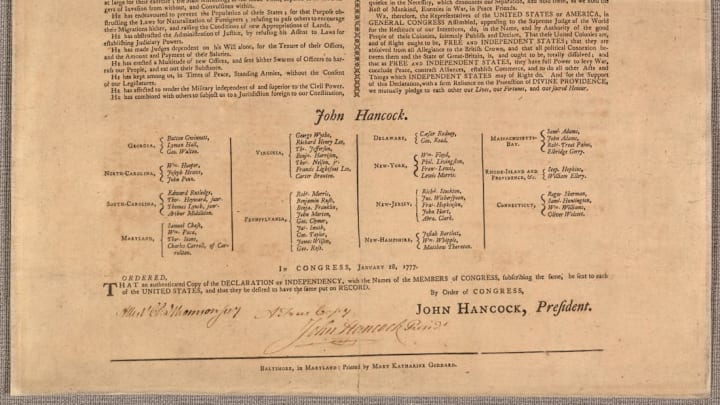As one of the country’s first woman publishers, Mary Katharine Goddard played a significant yet overlooked role in the American Revolution. She printed a Baltimore-based newspaper that ran articles about various Revolutionary War battles, and continued to print the paper even after her offices were raided. As the first woman postmaster in the colonies, she also ran the Baltimore Post Office and undoubtedly facilitated some important correspondence in her day.
However, her biggest assignment came in January 1777, when Congress asked her to print copies of the Declaration of Independence and deliver them to the 13 colonies. Her next step was a bold one: At the bottom of each page, she added her own name into the mix. “Baltimore, in Maryland: Printed by Mary Katharine Goddard,” the text reads. (Though her name was printed as Mary Katharine, she is often referred to as Mary Katherine in various texts.)
This copy of the Declaration was the first to include the full list of founders’ signatures. The only two names that appeared on previously printed copies were Continental Congress president John Hancock and secretary Charles Thomson. At the time, of course, signing a document that declared independence from Britain was akin to treason—and being a woman didn’t help matters, either.
This wasn’t the first time Goddard had published her name, though. Two years earlier, she had begun printing her name at the bottom of a newspaper called The Maryland Journal and the Baltimore Advertiser after her brother and business partner, William, left town to pursue other interests, according to the New York Public Library. Instead of including her full name, though, she had opted for “Published by M.K. Goddard.”
It’s unclear what prompted Goddard to print her full name at the bottom of the Declaration of Independence, but historians can venture a guess. “Perhaps Goddard was trying to secure her place in the story of the nation’s founding. We can only speculate,” writes the library, which owns two copies of the document, dubbed the Goddard Broadside.
Unfortunately for Goddard, her powerful position in the printing industry was short-lived. Her brother returned to Baltimore in 1784 and took over the newspaper once again, and her name was removed. She continued to serve as the postmaster for another five years until the new Postmaster General, Samuel Osgood, pushed her out of the job in 1789, arguing that women didn’t have the stamina for it. More than 200 people in Baltimore signed a petition demanding her reinstatement, but it was an unsuccessful bid.
Instead, Goddard ran a bookstore until her death in 1816. But she got the last laugh: Her name can still be seen on one of the nation’s most important historical documents.
A version of this story originally ran in 2019; it has been updated for 2023.
